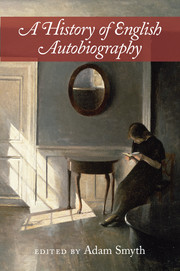Book contents
- Frontmatter
- Dedication
- Contents
- List of contributors
- 1 Introduction: The range, limits, and potentials of the form
- PART 1 AUTOBIOGRAPHY BEFORE ‘AUTOBIOGRAPHY’ (CA. 1300–1700)
- PART 2 RELIGION, GENDER, THINGS (CA. 1700–1800)
- PART 3 THE MANY NINETEENTH CENTURIES (CA. 1800–1900)
- PART 4 RELATIONAL LIVES AND FORMS OF REMEMBERING (CA. 1890–1930)
- PART 5 KINDS OF COMMUNITY (CA. 1930-CONTEMPORARY)
- 23 Poetry and autobiography in the 1930s: Auden, Isherwood, MacNeice, Spender
- 24 Documenting lives: Mass Observation, women's diaries, and everyday modernity
- 25 Postcolonial autobiography in English: The example of Trinidad
- 26 Around 2000: Memoir as literature
- 27 Illness narratives
- 28 Breaking the pact: Contemporary autobiographical diversions
- 29 The machines that write us: Social media and the evolution of the autobiographical impulse
- Index
- References
24 - Documenting lives: Mass Observation, women's diaries, and everyday modernity
from PART 5 - KINDS OF COMMUNITY (CA. 1930-CONTEMPORARY)
Published online by Cambridge University Press: 05 March 2016
- Frontmatter
- Dedication
- Contents
- List of contributors
- 1 Introduction: The range, limits, and potentials of the form
- PART 1 AUTOBIOGRAPHY BEFORE ‘AUTOBIOGRAPHY’ (CA. 1300–1700)
- PART 2 RELIGION, GENDER, THINGS (CA. 1700–1800)
- PART 3 THE MANY NINETEENTH CENTURIES (CA. 1800–1900)
- PART 4 RELATIONAL LIVES AND FORMS OF REMEMBERING (CA. 1890–1930)
- PART 5 KINDS OF COMMUNITY (CA. 1930-CONTEMPORARY)
- 23 Poetry and autobiography in the 1930s: Auden, Isherwood, MacNeice, Spender
- 24 Documenting lives: Mass Observation, women's diaries, and everyday modernity
- 25 Postcolonial autobiography in English: The example of Trinidad
- 26 Around 2000: Memoir as literature
- 27 Illness narratives
- 28 Breaking the pact: Contemporary autobiographical diversions
- 29 The machines that write us: Social media and the evolution of the autobiographical impulse
- Index
- References
Summary
I feel that at last the working classes of this country have begun to think for themselves and wake up. They have not been fooled by the bogey of voting ‘National’ or by Churchill's smiling face. They do not want to get back to 1939. The conscription and shortages have taught them democracy and that all men are really equal. I feel confident that a better world is going to be the result of this election and that the future in spite of so many difficulties is bright. (Wing 2008, 262)
This 31 July 1945 entry is taken from one of the several hundred personal wartime diaries that were kept by volunteers for the social research organisation Mass Observation (MO). Its focus on the everyday lives of ordinary people exemplifies the way in which the British documentary movement laid the groundwork for the 1945 political settlement. However, what particularly distinguishes MO's approach is the manner in which it sought to combine subjectivity with objectivity by encouraging its participants to observe both themselves and others. In this respect its strength lay in what Laura Marcus describes as the ‘hybridity of autobiography as a genre’, which enabled it to investigate the relationship between ‘private and the public’ within the context of the ‘rise of mass society’ (Marcus 1994, 7). The fact that MO participants were writing about themselves with the knowledge that their writing would be read by MO staff, might be published, and would certainly be made available to future researchers gave their work a unique status, lying somewhere between a conventional diary and a published autobiography. This mode of writing proved to be of great value both to intellectuals, such as Naomi Mitchison, whose case is discussed in detail in this chapter, and to ordinary women, such as the author of the extract above, Muriel Green. The self-reflexive insight she had developed by 1945 from writing for MO stemmed from her initial desire, which marked her and her sister out from the villagers they lived with, to participate in public debate by seeing their own words in print, as expressed in her diary entry for 19 April 1940:
Before we caught the bus home we went in the town library to ask if they had got ‘our’ book. […]
- Type
- Chapter
- Information
- A History of English Autobiography , pp. 345 - 358Publisher: Cambridge University PressPrint publication year: 2016
References
- 1
- Cited by



